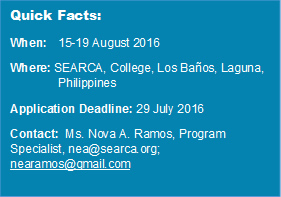
Background and Rationale
 Pressures to deliver the intended results of agricultural and rural development are growing. To address the inequitable and unsustainable growth in agriculture and in the rural sector, SEARCA has been pursuing Inclusive and Sustainable Agricultural and Rural Development (ISARD) in selected communities that are relatively left out of development, in collaboration with state universities and colleges (SUCs) and local government units. At the end of the project, it is hoped that “no one is left out and everyone is empowered in promoting sustainable development.”
Pressures to deliver the intended results of agricultural and rural development are growing. To address the inequitable and unsustainable growth in agriculture and in the rural sector, SEARCA has been pursuing Inclusive and Sustainable Agricultural and Rural Development (ISARD) in selected communities that are relatively left out of development, in collaboration with state universities and colleges (SUCs) and local government units. At the end of the project, it is hoped that “no one is left out and everyone is empowered in promoting sustainable development.”
However, the relevance, effectiveness, efficiency, sustainability, and impact of these ISARD initiatives should be continuously measured. Lessons should be learned and learning should be translated into actions. For this purpose, monitoring and evaluation (M&E) as management functions in ISARD program cycle need to be strengthened. The ISARD landscape needs a Results-based Monitoring and Evaluation (RBME) system that will track whether the program and the various component projects on the ground have achieved their intended outcome pathways. Furthermore, it helps determine whether the flow of resources/inputs and implementation of projects’ activities are on time. Finally, the system should also safeguard transparency, accountability and integrity.
This training-workshop is organized with these considerations. Generally, it is aimed to serve as a forum for participants (individuals and project teams) to learn and act collaboratively in understanding, developing, and utilizing an RBME system.
Goal and Objectives
At the end of this training-workshop, participants will be able to:
- Explain RBME in the context of ISARD programs and projects;
- Discuss key concepts, importance, processes, uses, and management of RBME;
- Prepare RBME framework and matrixes;
- Develop various RBME data collection instruments, forms, reporting system and report dissemination and utilization ways that will track inputs, outputs, outcomes and impact; and
- Discuss how to sustain an RBME system for ISARD programs/projects.
Outputs
The intended outputs and outcomes of the training-workshop are:
- Participants trained on RBME
- Indicative RBME Plan of ISARD program and projects developed. The indicative plan will consist of the following:
- Purposes of the RBME
- Stakeholders
- RBME Framework
- Tools, Forms, and Reports
- Sustainability of ISARD RBME System
Coverage
The training-workshop is made up of five modules. The first module reviews the existing ISARD M&E. Then, it discusses the what, why, for whom, when, and how of RBME and locates RBME in the ISARD program/project cycle management. After discussing RBME in the context of ISARD process, Module 2 centers on setting the core purposes, scope, stakeholders, and organization and management for ISARD RBME. Module 3 focuses on the discussion and construction of ISARD results and logical frameworks. It also covers a discussion of the RBME plan or schedule and the target/performance tracking matrix. Module 4 deals with how to operationalize the framework, data collection tools, data management, reporting, learning and action, and report dissemination and utilization. Finally, Module 5 tackles the sustainability of the ISARD system.
Methodology
This training-workshop will use a variety of adult learning methods. It has three ecture-discussions and Q&A to explain concepts, approaches, strategies and processes. It will also make use of workshops and buzz sessions to develop the skills of the participants in the use of different tools discussed in the course. Participants will present their workshops outputs in plenary sessions, intended to promote exchange of ideas to assess and to suggest improvements to these outputs.
Participants will develop a re-entry plan to get their commitment in using their learning from this course. Finally, organizers will administer a pre-test and post-test exercise to gauge improvement in individual knowledge on RBME.
Intended Participants
Officials and professional/technical staff of the following institutions:
- Government agencies whose mandate is to help resource-poor farmers and promote agricultural and rural development (ARD), including state colleges and universities;
- Nongovernment organizations (NGOs) that advocate ISARD in Southeast Asian countries; and
- Multilateral and bilateral development assistance organizations that operate in Southeast Asia.
Executive Forum Duration and Venue
15-19 August 2016 | SEARCA, College, Los Baños, Laguna, Philippines
Executive Forum Fee
- The forum fee is US$614.00 per participant, which covers training-workshop materials, meals during the duration of the training-workshop, accommodation (twin-sharing), and airport transfers. Live-out rate is US$388.00. Subsidized rates are available upon request to government employees.
- All other expenses associated with the training-workshop (international air travel, visa, airport terminal fees, travel/health insurance, and other personal expenses) are at the participants’ or his/her organization’s own expense.
NOTE: Limited training support is open only to qualified nationals of SEAMEO member countries (i.e., Cambodia, Indonesia, Lao PDR, Malaysia, Myanmar, Philippines, Thailand, Timor Leste, and Vietnam).
Applications
The deadline for filing of application with limited training support is 29 July 2016. Once awarded, grantees will have until 3 August 2016 to officially register for the forum. Deadline for filing of application for fee-paying participants is 29 July 2016. Course fees must be received by SEARCA before the training-workshop commences. Deadline for registration of fee-paying participants is 5 August 2016.
For the application form for fee-paying participants, please click here.
For training grant applicants, please click on the application form and nomination form.
Additional Information
 Program Flyer
Program Flyer
Registration Particulars
Travel Information
